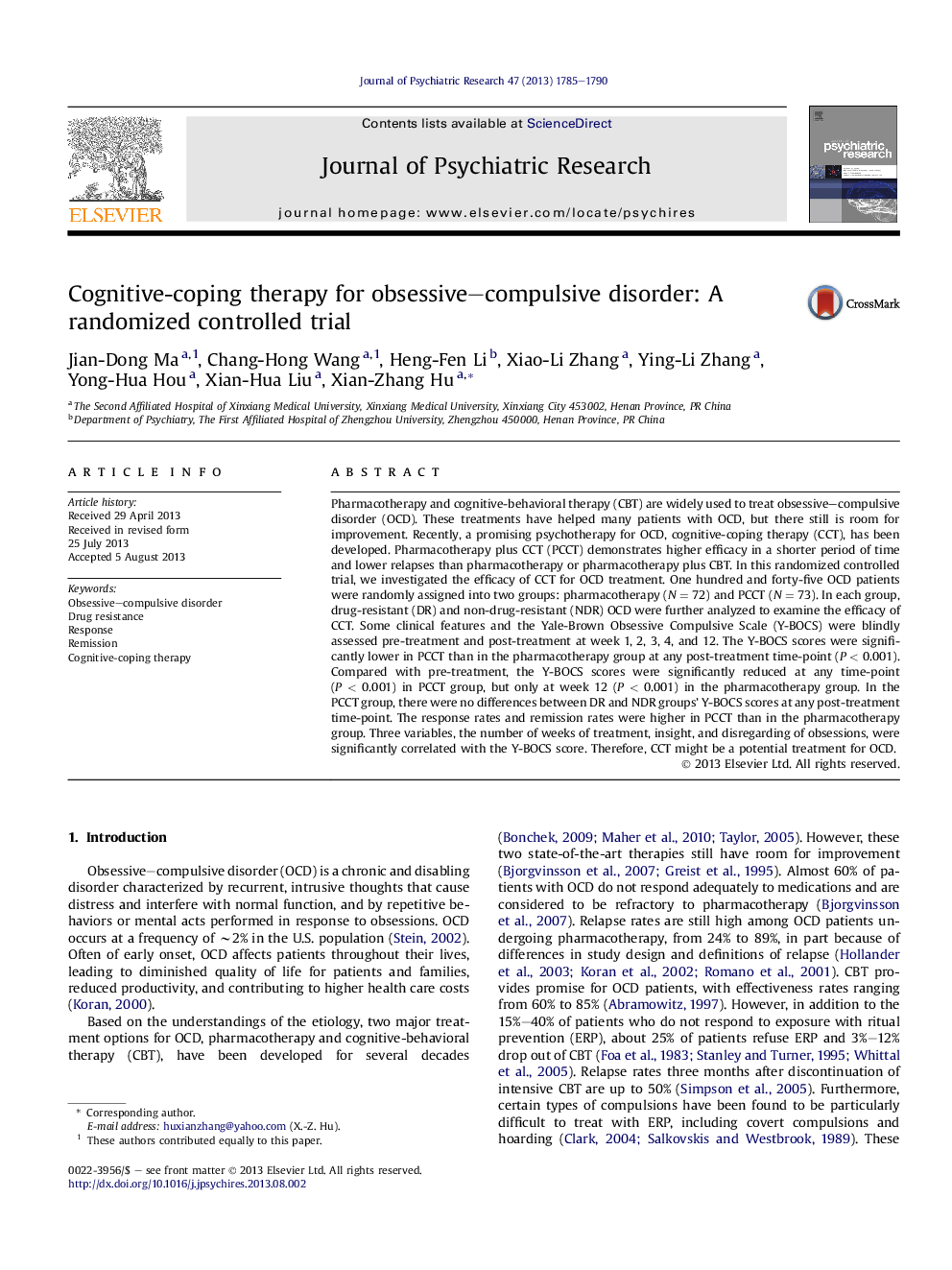| کد مقاله | کد نشریه | سال انتشار | مقاله انگلیسی | نسخه تمام متن |
|---|---|---|---|---|
| 10302478 | 542940 | 2013 | 6 صفحه PDF | دانلود رایگان |
عنوان انگلیسی مقاله ISI
Cognitive-coping therapy for obsessive-compulsive disorder: A randomized controlled trial
ترجمه فارسی عنوان
درمان شناختی-مقابله ای برای اختلال وسواسی-اجباری: یک کارآزمایی بالینی تصادفی شده
دانلود مقاله + سفارش ترجمه
دانلود مقاله ISI انگلیسی
رایگان برای ایرانیان
کلمات کلیدی
اختلال وسواس فکری مقاومت در برابر مواد مخدر، واکنش، ریزش، درمان شناختی-مقابله،
موضوعات مرتبط
علوم زیستی و بیوفناوری
علم عصب شناسی
روانپزشکی بیولوژیکی
چکیده انگلیسی
Pharmacotherapy and cognitive-behavioral therapy (CBT) are widely used to treat obsessive-compulsive disorder (OCD). These treatments have helped many patients with OCD, but there still is room for improvement. Recently, a promising psychotherapy for OCD, cognitive-coping therapy (CCT), has been developed. Pharmacotherapy plus CCT (PCCT) demonstrates higher efficacy in a shorter period of time and lower relapses than pharmacotherapy or pharmacotherapy plus CBT. In this randomized controlled trial, we investigated the efficacy of CCT for OCD treatment. One hundred and forty-five OCD patients were randomly assigned into two groups: pharmacotherapy (NÂ =Â 72) and PCCT (NÂ =Â 73). In each group, drug-resistant (DR) and non-drug-resistant (NDR) OCD were further analyzed to examine the efficacy of CCT. Some clinical features and the Yale-Brown Obsessive Compulsive Scale (Y-BOCS) were blindly assessed pre-treatment and post-treatment at week 1, 2, 3, 4, and 12. The Y-BOCS scores were significantly lower in PCCT than in the pharmacotherapy group at any post-treatment time-point (PÂ <Â 0.001). Compared with pre-treatment, the Y-BOCS scores were significantly reduced at any time-point (PÂ <Â 0.001) in PCCT group, but only at week 12 (PÂ <Â 0.001) in the pharmacotherapy group. In the PCCT group, there were no differences between DR and NDR groups' Y-BOCS scores at any post-treatment time-point. The response rates and remission rates were higher in PCCT than in the pharmacotherapy group. Three variables, the number of weeks of treatment, insight, and disregarding of obsessions, were significantly correlated with the Y-BOCS score. Therefore, CCT might be a potential treatment for OCD.
ناشر
Database: Elsevier - ScienceDirect (ساینس دایرکت)
Journal: Journal of Psychiatric Research - Volume 47, Issue 11, November 2013, Pages 1785-1790
Journal: Journal of Psychiatric Research - Volume 47, Issue 11, November 2013, Pages 1785-1790
نویسندگان
Jian-Dong Ma, Chang-Hong Wang, Heng-Fen Li, Xiao-Li Zhang, Ying-Li Zhang, Yong-Hua Hou, Xian-Hua Liu, Xian-Zhang Hu,
